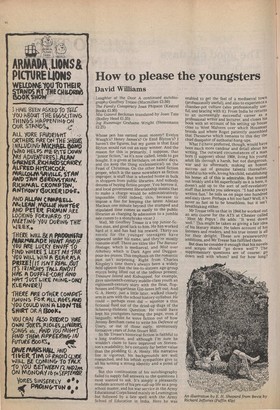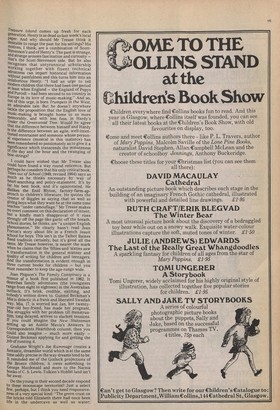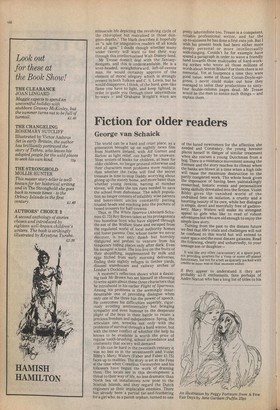How to please the youngsters
David Williams
Laughter at the Door A continued autobiography Geoffrey'Trease (Macmillan E3.50) The Family Conspiracy Joan Phipson (Kestrel Books £1.95)
Mb a Gunnel Beckman translated by Joan Tate (Bodley Head £1.35)
Jog Rummage Grahame Wright (Heinemann £2.25) Whose pen has earned most money? Evelyn Waugh's? Henry James's? Or Enid Blyton's? I haven't the figures, but my guess is that Enid Blyton would run out an easy winner. And the reason for this is primarily, I suppose, that "junior fiction," as it's now called, tends to get bought. It is given at birthdays, on saints' days, and (to keep the thing ecclesiastical) on the Feast of Christmas. On the other hand fiction proper, which is the same nowadays as fiction improper, is stuff that is wheeled home in bulk in shoppers from public libraries. And nobody dreams of buying fiction proper. You borrow it, and local government librarianship insists that to make a charge would be administratively impossible. (Odd indeed, this, because to impose a fine for keeping the latest Alistair Maclean one minute beyond the stamped and stipulated time comes as easily to the public librarian as charging 5p admission to a jumble sale comes to a stonybroke vicar.) Well, Mr Geoffrey Trease is a top junior-fiction man, and good luck to him. He has worked hard at it and has had his reward. Thirty-six novels for the younger teenagers have appeared under his name, and they're mostly costume-stuff. There are titles like The Barons' Hostage, which is mediaeval, and Mist over Athelney which is Dark Ages and Dugganpour-les-jeunes. This emphasis on the romantic past isn't surprising. Right from Charles Kingsley's time there's always been a widely held opinion that the ten-to-sixteen age-group enjoys being lifted out of the tedious present. Treasure Island and Kidnapped, for example, gave nineteenth-century middle-class youth an eighteenth-century story with the fleas, flophouses and Hogarthean Gin-lanes left out. And G. A. Henty, just.a little later, walked closely arm in arm with the school history-syllabus. He could — perhaps even did — squeeze a thin fictional fluid out of the dried-up dugs of the Scheswig-Holstein Question. He could have kept his youngsters turning the page, even if languidly, whilst he wove fiction out of how Jeremy Bentham came to write his Defence of Usury, or out of those early, strenuously formative years of John Stuart Mill.
So Mr Trease's historical fiction is faithful to a long tradition, and although I'm sure he wouldn't claim to have improved on Stevenson's readability, he's certainly far better value than the plodding G. A. Henty. His narrative line is vigorous, his backgrounds are well researched, and his leftish sympathies give to all his writing a strong identity and a point of view.
But this continuation of his autobiography failed to supply full answers to the questions I most wanted to ask. It's simply a pleasantly readable account of his pre-call-up life as a prep school master, and his war service in the Army Educational Corps based mainly in Leamington but followed by a late spell with the Army School of Education in India. Here he was enabled to get the feel of a mediaeval town (professionally useful), and also to experience a chamber-pot culture (also professionally useful, and bracing with it). From India he returns to an increasingly successful career as .0professional writer and lecturer, and closes his book with an account of his setting up house close to West Malvern over which Housman broods and where Roget patiently assembled that Thesaurus which remains to this day the chief dissipator of authorial hang-ups. What I'd have preferred, though, would have been much more candour and detail about his writing. The, outward circumstances of a man born (I suppose) about 1908, living his young adult life through a harsh, but not dangerous, war and its aftermath, making an honest success out of genuine talents thereafter, faithful to his wife, loving his child, establishing his home: all of this is admirable. But trotted out briskly and a bit superficially as it is here, it doesn't add up to the sort of self-revelatory stuff that knocks you sideways. "I had always written fast," he tells us on page one hundred and sixty three. Perhaps a bit too fast? Well, it:s never so fast as to be breathless, but it isn t breathtaking either.
Mr Trease tells us that in 1944 he worked out an arts course for the ATS at Chester called 'Meet Mr Pepys He adds: "It went down well." This might be taken as giving a fair idea of his literary stance. He takes account of his listeners and readers, and his true intent is all for their delight. These are praiseworthy ambitions, and Mr Trease has fulfilled them. But does he consider it enough that his novels and scripts should "go down well"? The supplementary questions are of course: go down well with whom? and for how long?
Treasure Island comes up fresh for each generation. Henty is as dead as last week's local paper. And why should Mr Trease think it desirable to range the past for his settings? His motives, I think, are a combination of ScottStevenson's and of Henty's. The past is strange, and strange arouses fascination and curiosity — that's the Scott-Stevenson side. But he also recognises that untyrannical scholarship Working together with fluent technical adroitness can impart historical information without painfulness and this turns him into an unlaborious Henty. "I had an urge to tell modern children that there had been one period at least when England — the England of Pepys and Purcell — had been second to no country in Europe in its love of music-making." And so, out of this urge, is born Trumpets in the West, an admirable tale. But he doesn't anywhere tackle the proposition that the English love of Music-making is brought home to us more Memorably, and with less fuss, in Hardy's Under the Greenwood Tree. Would he agree that the difference between himself and Hardy IS the difference between an agile, well-intentioned entertainer and someone whose personal experience (musical in this instance) has been remembered so passionately as to give it a significance which transcends the minuteness of the day and the hour and the twanging of bow-strings?
I could have wished that Mr Trease also could have-found a way round reticence. But Perhaps he considers that his only critical book, rales out of School (1949, revised 1964) says as Much as he thinks necessary by way of heart-searching and policy-statement. It's by far his best book, and it's opinionated. He dislikes the Enid Blyton, factory-farm-approach to children's literature. He quotes the creator of Biggles as saying that as well as giving boys what they want he at the same time teaches "under camouflage." Mr Trease makes no overt comment on this declaration of intent, but a kindly man's disapproval of it rises strongly off the page like garlic off the breath. School stories, he thinks, are "a unique English Phenomenon." He clearly hasn't read Jean Forton's story about life in a French Jesuit school for boys. This isn't in the Talbot Baines Reed tradition certainly, but it's good all the same. Mr Trease however, is nearer the mark When he claims that the 'fifties and 'sixties saw a transformation in the general manner and quality of writing for children and teenagers. And the transformation is evident enough in three current books for children — but you must remember to keep the age-range wide.
Joan Phipson's The Family Conspiracy is a reissue pf a book first published in 1962. It describes family adventures (the youngsters range from eight to eighteen) in the Australian outback. It's brisk, credible, exciting, and nobody's written down to. Gunnel Beckman's Mia is didactic in a frank and liberated Swedish Way. Mia, 17, is worried lest Jan, her twentyyear-old boy-friend, has made her pregnant. Mia struggles with her problem till menstruation, long delayed, arrives to slacken tensions. If you could imagine the New Statesman setting up an Auntie Mavis's Answers to Correspondents Heartthrob column, then you could also imagine — much more easily — Gunnel Beckman applying for and getting the Job of running it.
Grahame Wright's Joe Rummage creates a fantastic, dreamlike world which is at the same time oddly precise in the way dreams tend to be. It reminded me of the Gothick projections of the Bronte children; it owes something to George Macdonald and more to the Narnia books of C. S. Lewis. Tolkien's Hobbit land isn't far away.
Do the young in their second decade respond to these moonscape territories? Just a select few, perhaps, but I think you need responsiveness of a very special kind: "The green crust on the bricks told Elizabeth there had once been life in the undercave as well as water; minuscule life depicting the revolving cycle of the chloroplast but restrained in those dungeon-depths." The blurb describes it hopefully as "a tale for imaginative readers of all kinds and all ages." I doubt though whether many under twenty will want to feel their way through this intellectualised Walt-Disney-land. Mr Trease doesn't deal with the fantasymongers, and this is understandable. He is a level-headed, straightforward, left-of-centre man. He would certainly approve of the element of moral allegory which is strongly present in both Tolkien and C. S. Lewis, but he would disapprove, I think, of the hard, gem-like flame you have to light, and keep lighted, in order to guide you through their labyrinthine by-ways — and Grahame Wright's ways are pretty labyrinthine too. Trease is a competent, reliable professional writer, and for the up-to-sixteens he has done a first-rate job. But I wish his present book had been either more deeply personal or more intellectually wide-ranging. Couldn't he for example have spared a paragraph in order to wave a friendly hand towards those multitudes of hard-working scribes who wrote all those millions of words about Sexton Blake? For them there is no memorial. Yet at fourpence a time they were good value, some of those Conan-Doyle-epigones. I never could make out how they managed to tailor their productions to sixtyfour double-column pages dead. Mr Trease would be the man to notice such things — and explain them.




































































 Previous page
Previous page